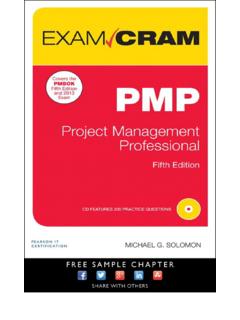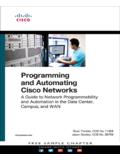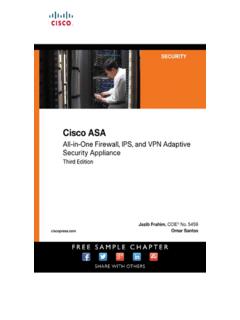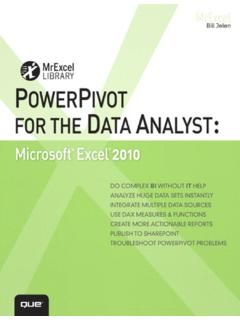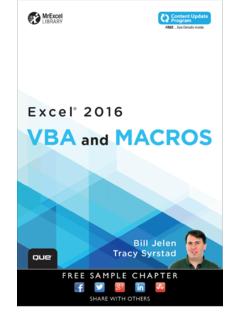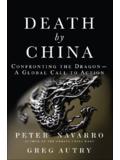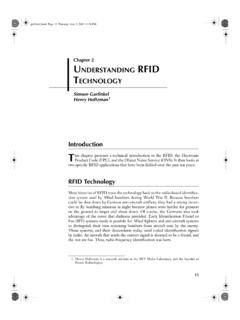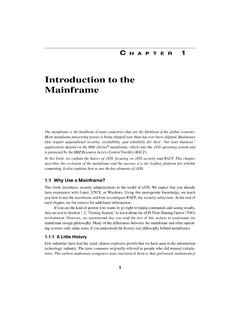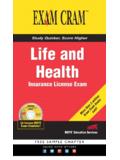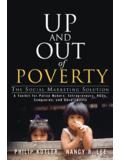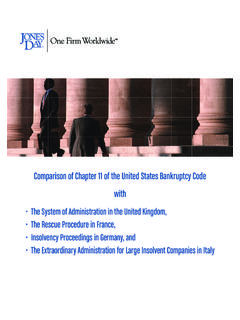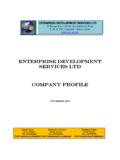Transcription of THE DEFINITIVE GUIDE TO MANAGEMENT - …
1 THE DEFINITIVE GUIDE TO integrated supply chain MANAGEMENTThis page intentionally left blank THE DEFINITIVE GUIDE TO integrated supply chain MANAGEMENTOPTIMIZE THE INTERACTION BETWEEN supply chain PROCESSES, TOOLS, AND TECHNOLOGIESC ouncil of supply chain MANAGEMENT ProfessionalsBrian J. GibsonJoe B. HannaC. Clifford DefeeHaozhe Chen Vice President, Publisher: Tim MooreAssociate Publisher and Director of Marketing: Amy NeidlingerExecutive Editor: Jeanne Glasser Levine Consulting Editor: Chad AutryOperations Specialist: Jodi KemperCover Designer: Chuti PrasertsithManaging Editor: Kristy HartProject Editor: Deadline Driven PublishingCopy Editor: Deadline Driven PublishingProofreader: Deadline Driven PublishingIndexer: Angie MartinCompositor: Bronkella PublishingManufacturing Buyer: Dan Uhrig 2014 by Council of supply chain MANAGEMENT ProfessionalsPublished by Pearson EducationUpper Saddle River, New Jersey 07458 For information about buying this title in bulk quantities, or for special sales opportunities (which may include electronic versions; custom cover designs.)
2 And content particular to your business, training goals, marketing focus, or branding interests), please contact our corporate sales department at or (800) government sales inquiries, please contact For questions about sales outside the , please contact Company and product names mentioned herein are the trademarks or registered trademarks of their respective rights reserved. No part of this book may be reproduced, in any form or by any means, without permis-sion in writing from the in the United States of AmericaFirst Printing December 2013 ISBN-10: 0-13-345392-8 ISBN-13: 978-0-13-345392-8 Pearson Education Education Australia PTY, Education Singapore, Pte. Education Asia, Education Canada, Educaci n de Mexico, de Pearson Education JapanPearson Education Malaysia, Pte. of Congress Control Number 2013952810 The authors would like to dedicate this book to our families. We greatly appreciate the encouragement, patience, and sup-port that they have provided throughout our careers and this endeavor.
3 Brian Gibson would like to thank his wife Marcia and son Andy. Joe Hanna would like to thank his wife Amy and children Mark and Sara. Cliff Defee would like to thank his wife Joi and kids Mason, Collin, Jesse, Casey, Drew, and Scott. Haozhe Chen would like to thank his wife Jing and daughter Connie. This page intentionally left blank vii ContentsCONTENTS Foreword ..xi 1 Defining the supply chain ..1 2 supply chain Structure, Processes, and Trade-Offs ..29 3 Key Strategic Principles ..71 4 supply chain Information and Technology ..111 5 Managing the Global chain ..147 6 World Class supply chain Performance ..177 7 The supply chain of the Future ..205 Index ..221 This page intentionally left blank ix About the AuthorsABOUT THE AUTHORSB rian J.
4 Gibson, , holds the Wilson Family Professorship in supply chain Manage-ment at Auburn University. Drawing upon his experiences as a logistics manager, Dr. Gibson is recognized as an innovative educator who brings a practical perspective to the classroom. He is coauthor of more than 100 academic and practitioner-focused articles, the annual State of the Retail supply chain Report, the supply chain Essentials video series, and two market-leading textbooks. Dr. Gibson is active in the SCM community, serving on the CSCMP Professional Certification Committee, the NASSTRAC Education Committee, the RILA Logistics Steering Committee, and the Accenture Academy SCM content development team. Joe B. Hanna, , serves as Associate Dean and Regions Bank Professor of supply chain MANAGEMENT at Auburn University. Dr. Hanna has published over sixty articles and is active in Auburn s undergraduate, graduate, and executive education programs.
5 Joe has also performed education and/or consulting for several firms including Pratt Whitney, Hyundai, Menlo Logistics, Pacer International, Transplace, Fortna supply chain Con-sulting, SMC3, Kane is Able, and others. Prior to entering academia, Dr. Hanna gained practical experience with Phillips Petroleum (now ConocoPhillips), Phillips 66 Chemical Company (now ChevronPhillips Chemical Company), and Coopers and Lybrand (now Pricewaterhouse Coppers). Cliff Defee, , is the EBSCO Associate Professor of supply chain MANAGEMENT at Auburn University. Dr. Defee s work has been nationally recognized, most recently as coauthor of articles that received best paper of the year distinctions in Journal of Business Logistics (2009) and Transportation Journal (2010). He is coauthor of the annual State of the Retail supply chain Report. Dr. Defee co-founded outsourced services provider PFSweb and he served as Chief Operating Officer for six years following a 13-year career with Accenture.
6 Haozhe Chen, , is an Associate Professor of Marketing and supply chain Manage-ment in the College of Business at East Carolina University. He has published more than 20 articles in leading logistics and supply chain MANAGEMENT journals, and his current research interests include reverse logistics, supply chain integration, supply chain rela-tionships, and international logistics. He is especially interested in China-related logistics topics and issues. He has eight years industry experience in international trade business in China, and he is an active member of ASTL, CSCMP, ISM, RLA, and AcknowledgmentsACK NOWLEDGMENTSThe authors would like to acknowledge the contributions of our mentors and colleagues for helping us develop the knowledge and skills needed to author this book. We would also like to recognize the team of dedicated supply chain MANAGEMENT professionals who recognized the critical need for the SCPro Certification program.
7 Rick Blasgen, Kathleen Hedland, Ann Neumann, Kathy McInerney, Heather Morys, and everyone at CSCMP. We thank Dr. Ted Stank (University of Tennessee), Dr. Chris Moberg (Ohio University), and Dr. Tom Speh (Miami University) who deserve special recognition for leading SCPro from concept to reality (and for allowing Brian Gibson to ride along on the journey). It is also important to acknowledge the essential contributions of Dr. Chad Autry (University of Tennessee) and Jeanne Levine at FT Press for creating the supply chain book series and for being patiently persistent during the development process. xi ForewordFOREWORDS upply chain and supply chain MANAGEMENT have become household phrases supported by newspapers, television, and electronic media advertising of many companies over the last few years.
8 Although it has become a well-known term, I don t think it has a well understood, broadly accepted definition that everyone understands, and it has not penetrated very deeply throughout the general public. One may wonder why that is. Certainly many think they know the definition of well-known business activities such as marketing, sales, and finance. Marketing, for example, while under its present con-cept started sometime in the eighteenth and nineteenth centuries during the Industrial Revolution. Even so, today marketing has, based on some recent articles, more than 72 different definitions authored by respected organizations and senior business leaders. In addition, most definitions given by the general public of any of the above would just be scratching the surface of each discipline, because of the evolution of supply capabilities and market saturation and evolving technologies, causing the discipline to continue to branch out into many detailed business specialties.
9 supply chain MANAGEMENT had its origins first within the marketing discipline as distri-bution. Later, in accumulated activities, it came under logistics, and then into a much more inclusive set of activities that were defined within this program. supply chain man-agement by its accepted definition includes multiple specialties as well as multiple orders of complexity. At its core, it addresses the attainment of excellence in a number of func-tional activities historically defined under the discipline of logistics. It then addresses the requirements of additional traditionally separate functions, requiring coordination and collaboration among themselves as well as with the balance of needed functions to operate any company. Finally, it requires proficiency to extend coordination and col-laboration of the company with strategic supply chain partner organizations and many of their internal functional groups of key material and service suppliers and customers/consumers, which the company believes necessary to optimize its profit growth and level of service.
10 I will unpack some of what I have just said to hopefully impart why beginning a learning journey using the CSCMP Pro Level program is so critical first let me state that what you will not find in this program is a cookie cutter design of a supply chain or supply chain MANAGEMENT . In my experience, the prerequisite for any supply chain model or supply chain MANAGEMENT organization is that it must meet the basic characteristics of the business and industry within which it is operating and follow the strategies intended for that specific business and culture and be guided by the historical disposition of the company. In addition, do not expect to find many compa-nies having the same definition and responsibilities for even a given function within a xii Forewordsupply chain organization. In my 40 years working within the supply chain area, I have lead a number of logistics or supply chain organizations, each of which had very different responsibilities.
